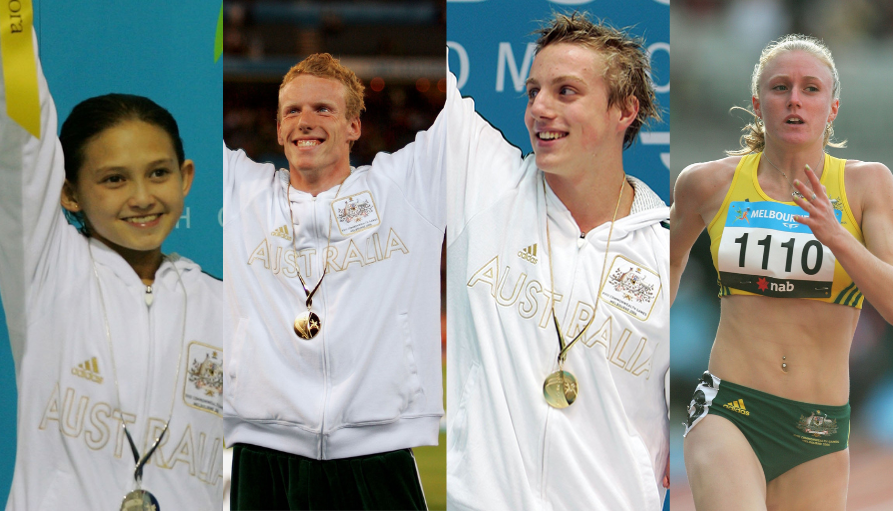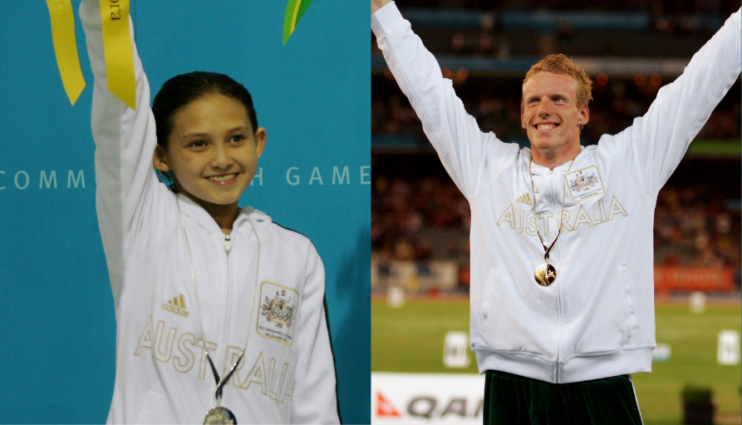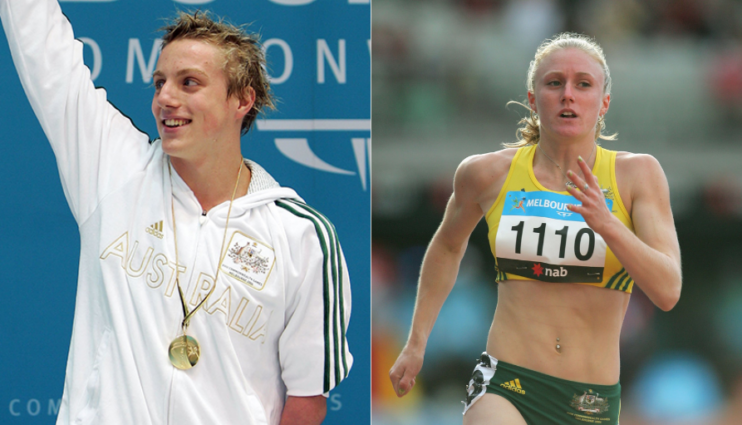
By Josh Squire
For some, the Melbourne 2006 Commonwealth Games was symbolised by certain moments. Perhaps it was the Route 36 tram that floated down into the MCG at the Opening Ceremony that brings back memories. Or Kerryn McCann’s spine-tingling victory in the women’s marathon, edging out Kenyan Hellen Cherono Koskei by just two seconds. Who could forget the roar of the crowd as the defending champion entered the stadium neck and neck with her competitor, and the ensuing pandemonium when she strode away to claim gold at the ripe old age of 38.
Maybe it was simply the spectacle. The baton relay. The atmosphere. Swathes of Melbournians, joined by fans from all over Australia and the world, packed into sporting arenas and stadiums across the city, cheering on the best athletes from across the Commonwealth.
Offering 735 medals to over 4000 athletes, not only was it the largest Games in history to that point, but it was also a Games of firsts. The first time the baton relay made it to all 71 Commonwealth countries. The first time that Opening Ceremony celebrations spilled out of the host stadium into the city. The first-time volunteers were invited to participate in a Closing Ceremony to receive their thanks in person.
Some of Australia’s most iconic sporting icons competed at the 2006 Games. From those who had already accomplished so much in their sport and were bringing their careers to a close – like five-time Commonwealth Games gold medallist Michael Klim (swimming) and two-time gold medallist Janine Ilitch (netball) – to those who were on their way to greatness – like cyclist Anna Meares and weightlifter Deborah Acason.
But for some of the athletes competing, the Games were a starting point in their careers. Not only was it their first Commonwealth Games, but for many of them it was their first senior international competition. Some of Australia’s greatest Commonwealth Games athletes began their journey at the 2006 Games. Let’s take a look back at the early days of a few of them.

Melissa Wu – Dipping her Feet in the Water
Not many 13-year-olds can say they have been to the Commonwealth Games to watch it live, let alone compete in it. But when the Melbourne Games rolled around in 2006, Melissa Wu was lining up alongside former gymnast Alexandra Croak in the 10m synchronised platform final.
A team consisting of someone who had only started diving a couple years prior and a year eight student probably doesn’t look overly strong on paper, but the duo clicked instantly, winning the silver medal in the event.
Wu went on to compete in the women’s individual 10m platform, qualifying for the final in sixth position. Although she finished outside of the medals (fifth), she was able to take the confidence from the Games into future events, where she quickly cemented herself as a world class diver.
Success didn’t stop there for the Aussie, as Wu would go on to win silver in the 10m synchro with Bree Cole at the 2007 World Championships before taking her talents to the Beijing 2008 Olympic Games the following year. Competing again in the 10m synchro event with Cole, Wu became the youngest Australian diver ever to win an Olympic medal, finishing in the silver medal position at just 15-years-old.
Over the next decade and a half, Wu consistently found herself in the mix in major events and medalled on numerous occasions. She returned to the Commonwealth Games podium at Delhi 2010, reuniting with Croak to take out the 10m synchro event, her first Commonwealth Games gold medal.
Now with a trophy cabinet that sports two Olympic medals, three World Championships medals and five Commonwealth medals (including three gold), the 31-year-old has come a long way from her first dive at the Melbourne Sports and Aquatic Centre 18 years ago.
At the closing ceremony, Wu was named as the flagbearer as a celebratory nod to her achievements in her fifth Commonwealth Games.
Still writing the words in a storied career, her next focus is making a fifth Olympic Games team.
Steve Hooker – Launching an Epic Career
Steve Hooker’s career didn’t start at Melbourne 2006. In fact, he was already an Olympic athlete by the time the Melbourne Games swung around, having competed at Athens in 2004, finishing 15th. The foundations were laid.
When he got his chance to compete for a Commonwealth Games medal, Australia’s greatest male pole vaulter showed the first signs that he had the ability to perform on the biggest stages. Not only did he claim the victory with a jump of 5.70m, but he also then went on to set a new Games record after clearing the 5.80m mark. In an attempt to become the 14th person to join the elusive ‘six-metre club’, Hooker rose the bar to 6.01m, but subsequently failed all three of his jumps.
At just 23-years-old entering the competition, Hooker was starting to hit his straps. With the backing of a Commonwealth Games gold medal, he produced a spectacular year in 2008, becoming the 15th member to break into the six-metre club, before qualifying fifth for the pole vault final at the Beijing Olympics. In a tense final, Hooker snared gold with a clutch third attempt at 5.90m and furthered his status as a great of Australian track and field by producing an Olympic record jump of 5.96m.
Winning was all Hooker did for a while, holding every major pole vault title at once in 2010. A World Championships victory in 2009 followed by a return to the Commonwealth Games top step in Delhi the following year ended a sparkling prime.
By the time he retired in 2014, just eight years after his breakthrough Commonwealth Games gold, Hooker had built an empire on top of his early foundations, catapulted by his Commonwealth Games success.

Matthew Cowdrey – No Barriers to Greatness
Although Matt Cowdrey was already a strong presence in para-swimming – taking home three golds, two silvers and a bronze from the Athens 2004 Paralympic Games – Melbourne 2006 was where he really established his dominance. Waltzing into a Commonwealth Games and walking out with two World records is no mean feat. Let alone the fact he did this all before the age of 18.
Lining up for the 50m freestyle final alongside fellow Australian and three-time Commonwealth Games gold medallist Ben Austin, Cowdrey knocked over the world record on his way to the gold, but it was the stellar showing in the 100m freestyle that slammed him into the record books. His time of 56.73s was 1.2 seconds faster than the previous world record line in the men’s S9 class.
If his dominance in Melbourne was impressive, what it inspired him to do next was other worldly. Cowdrey’s next major event, the Beijing 2008 Paralympic Games, was gold-laden to say the least. Competing in six events in the S9 category, he amassed four golds and two silvers including four World records, showing off his versatility by winning everything from the 50m freestyle to the 200m individual medley. Cleaning up another gold and silver medal in relay events, Cowdrey’s Games were the most successful of any athlete who competed in Beijing, and he drew comparisons to Michael Phelps with his ability to perform well in any stroke.
Success followed Cowdrey throughout the rest of his career. A successful return to the Commonwealth Games in 2010 netted him another gold and a further silver at the Glasgow 2014 Games brought his tally up to four medals at the Commonwealth Games. But it was the Paralympics where he dined out, finishing his career with 23 Paralympic medals including 13 gold and five world records at the time of his retirement in 2015.
Sally Pearson – Honing her Craft
Despite the odd exception, not many athletes strike gold in their first major international competition. Regardless of what an athlete goes on to achieve, immediate success is not guaranteed. Michael Phelps did not medal at his first Olympics. Kaylee McKeown did not find the podium at her first Commonwealth Games. Arguably Australia’s greatest female track athlete ever is no exception.
Saying that Sally Pearson was luckless in her first major senior international event would be an understatement. Coming into the Melbourne Games at just 19-years-old, Pearson, then known by her maiden name McLellan, hit the second last hurdle in the final of the 100m hurdles and was disqualified. She was also a part of an Australian team contending for gold in the 4x100m relay when they faltered on their final baton change and slipped to third. But breaking the ice of international competition was enough to spur Pearson to greatness.
What followed was a silver medal at the Beijing Olympics – the first medal of any kind in hurdles for an Australian in 40 years – where the Aussie youngster out-dipped four of her opponents to claim second place. The run also set a new Australian record in the hurdles at 12.64s, which she would better by three tenths of a second in her greatest victory of her career at the London 2012 Olympic Games.
World Athletics Championship success couldn’t elude Pearson either. She took the 2011 title in Daegu and silver in Moskva in 2013 before one last hurrah in 2017 ended in a gold medal inside the London Stadium, where she won her Olympic gold medal five years previous.
After her initial appearance, Pearson returned to the Commonwealth Games twice more, taking gold in the 100m hurdles in both Delhi and Glasgow. Injuries ruled her out of a chance at a three-peat at the 2018 Gold Coast Games, and in 2019 she announced her retirement.
